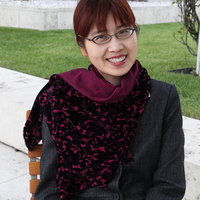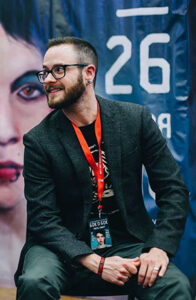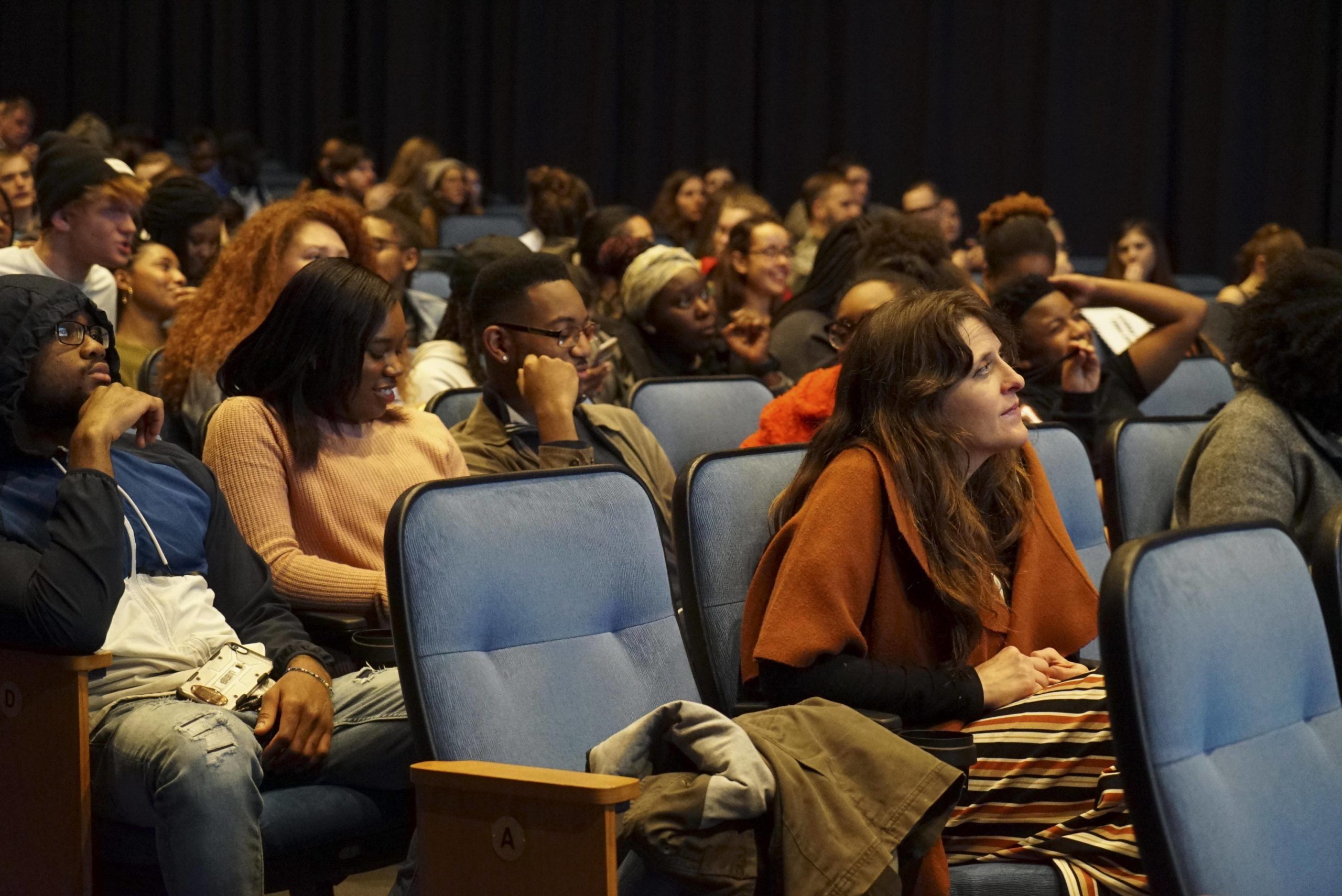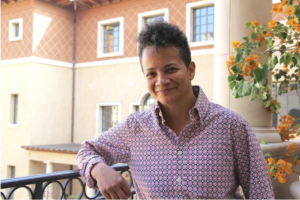Film Theory and Visual Culture Seminar
Hosted by Vanderbilt’s Robert Penn Warren Center for the Humanities and coordinated by CMA faculty, this seminar meets three or four times a semester to hear presentations by visiting scholars or by Vanderbilt’s own faculty and graduate students. The topics are wide-ranging and include the following areas of inquiry: film, visual culture, art history, literature, cultural studies, as well as theories of the image, philosophies of perception, aesthetics and critical theory, media histories, and the history of vision. Attendees should RSVP for individual meetings through the Robert Penn Warren Center website. All seminars are free and open to the Vanderbilt community.
Upcoming Seminars
FALL 2023

Claire Sisco King (Vanderbilt University). “Mapping the Stars: A Conversation with Claire Sisco King”
Friday, September 15, 2:00 PM
Robert Penn Warren Center for the Humanities
Abstract: Claire Sisco King discusses her new book Mapping the Stars: Celebrity, Metonymy, and the Networked Politics of Identity (Ohio State University Press, 2023) with Lutz Koepnick (Vanderbilt University. Often dismissed as trivial or even “trash,” celebrity culture offers a unique way of considering what it means to be human. In Mapping the Stars, Claire Sisco King shows how close analysis of the complex and sometimes contradictory forms of celebrity culture can challenge dominant ideas about selfhood. In particular, as a formation that develops across time, mediums, and texts, celebrity is useful for demonstrating how humanness is defined by relationality, contingency, and even vulnerability. King considers three stars with popular and controversial personas: Norman Rockwell, Will Smith, and Kim Kardashian. Working in very different contexts and with very different public images, these figures nonetheless share a consistent, if not conspicuous, interest in celebrity as a construct. Offering intertextual readings of their public images across such sites as movie posters, magazines, cinema, and social media—and deploying rhetorical theories of metonymy (a linguistic device linking signifiers by shared associations)—King argues that these stars’ self-reflexive attention to the processes by which celebrity is created and constrained creates opportunities for reframing public discourse about what it means to be famous and what it means to be a person.
Bio: Claire Sisco King is Associate Professor of Communication Studies and Cinema & Media Arts at Vanderbilt University and Chair of the Department of Cinema & Media Arts.
Thursday, September 14th. In conjunction with the Friday talk, Claire King presents Hancock (Berg, 2008) at International Lens film series at Sarratt Cinema at 7:30 p.m. Free and open to the public.
Shonni Enelow (Fordham University): “Absorption and the Films of Joanna Hogg.”
Friday, October 27, 2:30 PM, RPWC.
Abstract: This talk explores the films of Joanna Hogg through the concept of absorption. First theorized by art historian Michael Fried to describe the modernity of eighteenth-century French paintings in which figures turn away from the beholder and towards a diegetic scene, absorption is one way artists assert their works’ self-sufficiency and separateness. I read Hogg’s films The Souvenir and The Souvenir Part II, which center on an eighteenth-century painting by Jean-Honoré Fragonard, as a meditation on absorption, drawing from both Fried and psychoanalytic theorist Joan Copjec, who takes absorption as an aesthetic demonstration of love. Hogg’s films use the indirection of absorption to draw the viewer into a relation of attachment and at the same time to maintain their alterity. They both diegetically represent, in their characters, and formally enact, in their presentation to the viewer, absorbed relations of mysterious and inexplicable attachment. This talk focuses in particular on the final sequences of the Souvenir films, in which the absorbed relation between the filmmaker and her artwork enters the scene.
Bio: Shonni Enelow is Professor of English at Fordham University and the author of Method Acting and Its Discontents: On American Psycho-Drama (Northwestern University Press, 2015), which won the George Jean Nathan Award for Dramatic Criticism. Her scholarship has appeared in Modern Drama, Theater, Theatre Survey, and Theatre Topics; her article “Sweating Tennessee Williams” won the Modern Drama Prize in 2019. She writes regularly for Reverse Shot and has also written for Film Comment, MUBI Notebook, and for the Criterion Collection. Her book with visual artist David Levine, A Discourse on Method, was published by 53rd State Press in 2020. Her monograph on the filmmaker Joanna Hogg will be published by the University of Illinois Press in 2024.
On Thursday, October 26th, Enelow will present The Souvenir (Hogg, 2019) at the International Lens film series at Sarratt Cinema at 7:30 p.m. Free and open to the public.
Kara Keeling (University of Southern California):“Marvels of … Inventiveness”: On Aesthetics and Governance”
Friday, December 1, 2:00 pm., RPWC
Bio: Kara Keeling is Professor of Cinema and Media Studies and American Studies and Ethnicity at the University of Southern California. Keeling is author of Queer Times, Black Futures (New York University Press, 2019) and The Witch’s Flight: The Cinematic, the Black Femme, and the Image of Common Sense(Duke University Press, 2007) and coeditor (with Josh Kun) of a selection of writings about sound and American Studies entitled Sound Clash: Listening to American Studies (Johns Hopkins University Press, 2012), and (with Colin MacCabe and Cornel West) a selection of writings by the late James A. Snead entitled European Pedigrees/African Contagions: Racist Traces and Other Writing (Palgrave Macmillan, 2003).
SPRING 2023

Rizvana Bradley (University of California, Berkeley) presents “Documentary Film and the Aestheticization of Violence”
Friday, February 10, at 12:30 PM
Concerning Violence is available to stream through the library’s Kanopy subscription.
Abstract: This talk explores Göran Olsson’s 2014 documentary, Concerning Violence, and its representation and archival reconstruction of the insurgent thought and philosophy of Frantz Fanon as these are imagined to take shape in the specific contexts of anticolonial politics in Africa in the 1960s. Exploring Olsson’s documentary and its philosophical probing of Fanon’s writings, the talk interrogates what some have variously theorized as the new humanism that Fanon’s thinking inaugurates in relation to more general questions about race, gender, and aesthetics that Olsson’s film prompts. At stake is the role of art and aesthetics in the valuation of human life, and, in contradistinction – if perhaps unconsciously – the revaluation of the human. Central to the talk is a consideration of the way this film’s frequent aestheticization of suffering is bound up with a manipulation of formal concerns that appear to be medium specific. The talk opens by revisiting Saidiya Hartman’s central query from the essay, “Venus in Two Acts” (2008). There, Hartman asks: “What are the stories one tells in dark times?” Bringing Hartman’s question to bear on the practices of documentary film, photography, and painting, I explore whether Olsson’s film and its dark return to the archive of colonialism ensures a dangerous form of epistemological closure – and whether to see and to know the history of the colonized is to violently repeat the biopolitical reduction of the colonized to specific signatures of dispossession.
Bio: Rizvana Bradley is Assistant Professor of Film and Media Studies at the University of California, Berkeley. She holds a BA from Williams College and a PhD from Duke University. Bradley’s monograph, Anteaesthetics: Black Aesthesis and the Critique of Form, a recipient of the Creative Capital | Andy Warhol Foundation Arts Writers Grant, will be published this year, in 2023, by Stanford University Press. Bradley has published articles in Diacritics: A Review of Contemporary Criticism, Film Quarterly, Black Camera: An International Film Journal, Discourse: Journal for Theoretical Studies in Media and Culture, TDR: The Drama Review, Rhizomes: Cultural Studies in Emerging Knowledge, and Women and Performance: A Journal of Feminist Theory.
 Patricia White (Swarthmore College) presents “Women’s Cinema, Now?”
Patricia White (Swarthmore College) presents “Women’s Cinema, Now?”
Friday, March 3, at 12:30 PM
Abstract: This presentation on recent arthouse films by women directors invites input on a book project interrogating how such films hold space and mark time for transformative, transnational feminist cultural production. The titles of Eliza Hittman’s Never, Rarely, Sometime Always (2020), about a young Pennsylvania woman’s difficulties accessing abortion, and Joanna Hogg’s The Eternal Daughter (2022), about a middle-aged woman artist’s grief around losing her mother, signal their interest in “women’s time”: they address enduring issues in women’s lives in what might seem belated ways. Invoking the concept from Julia Kristeva’s 1979 essay “Women’s Time”/“Le temps des femmes,” feminists in the 1970s and 1980s called for a women’s counter cinema. How does women’s current unprecedented access to a shrinking arthouse sector resonate with that call? A representation of resilience in the face of reproductive rights rollbacks (anticipating 2022’s Dobbs decision) through an aesthetics of care, Never, Rarely, Sometimes, Always is shaped by a fifty-year history of feminist reproductive rights and media activism. The Eternal Daughter evokes Eurocentric psychoanalytic feminist film theory in its tongue-in-cheek staging of a gothic drama of maternal separation. To mention another example, Marie Kreutzer’s Corsage (2022) punctures the liberal feminist, European coproduction heritage genre with pointed anachronism. Interrupting the assimilation of contemporary women filmmakers to depoliticized discourses of art cinema and auteurism, my readings invoke another time.
Bio: Patricia White is Centennial Professor of Film and Media Studies and Coordinator of Gender and Sexuality Studies at Swarthmore College. Her books include Rebecca; Women’s Cinema/World Cinema: Projecting Contemporary Feminisms, and Uninvited: Classical Hollywood Cinema and Lesbian Representability. She is also co-author with Timothy Corrigan of The Film Experience, now in its 6th edition.White serves on the boards of Women Make Movies and Film Quarterly and is a member of the Camera Obscura editorial collective, overseeing its book series with Duke University Press.
 Bliss Lim (University of Toronto) presents “Silence, Power, and Making Do: Keywords for Philippine Cinema’s Archival Afterlives”
Bliss Lim (University of Toronto) presents “Silence, Power, and Making Do: Keywords for Philippine Cinema’s Archival Afterlives”
Friday, April 7, at 2:30 PM
Abstract: The contours of Philippine cinema’s archival crises are alarming: of over 350 films produced before the outbreak of World War II, only five Filipino films from the American colonial period survive. The dupe negative of the last surviving Filipino film on nitrate, Ibong Adarna (Adarna Bird, dir. Vicente Salumbides and Manuel Conde, 1941), was destroyed shortly after its 2005 restoration.
Drawing on postcolonial historiography, archival theory, and the on-the-ground realities of the Philippines’ decentralized audiovisual archive advocacy, this talk examines three issues that emerge as keywords for the crises of moving image preservation in the Philippines. First, archival silences, which comprise not only the “lost films” of Philippine cinema but also the absences that are constitutive of the production of historical narratives. Second, archival power, which names dynamics of inclusion/exclusion in the production of historical narratives, as well as archival practices of appraisal that institutionalize a minute percentage of extant records. Finally, activism, advocacy, and “making do” — creative workarounds that have emerged to ensure the archival survival of Philippine cinema — are also expressions of archival power. In response to my research request for access copies of 16mm propaganda films made in 1971-72, on the eve of the Marcos dictatorship’s declaration of Martial Law (PFM’s Declaration of Martial Law and From a Season of Strife), a handful of archivists from the Philippine Information Agency (PIA), the Cultural Center of the Philippines (CCP) and the Society of Filipino Archivists for Film (SOFIA) collaborated to produce rushed digital access copies of these films in 2015. The result of our collective efforts were undoubtedly poor images. Yet the makeshift digitization itself exemplified non-idealized archival practices of making do (paggawa ng paraan) that marshal meager resources to buy time and keep things going. Given that the histories of prior state film archives’ collapse caution against the costs of inaction, perseverance and making-do in order to ensure access are striking traits of Philippine archiving cultures called-forth by conditions of archival fragility.
Bio: BLISS CUA LIM is Professor of Cinema Studies at the University of Toronto. She is the author of Translating Time: Cinema, the Fantastic and Temporal Critique (Duke University Press, 2009; Ateneo de Manila University Press, 2011) and a member of the Editorial Collective of the journal, Camera Obscura: Feminism, Culture, and Media Studies and the Advisory Board of Plaridel: A Philippine Journal of Communication. Her forthcoming book, The Archival Afterlives of Philippine Cinema (Duke University Press), analyzes the crisis-ridden history of film archiving in the Philippines.
Past Seminars
FALL 2022
 Kate Rennebohm (Social Sciences and Humanities Research Council of Canada, Concordia University) presents “The Mediations of Self-Viewing and the Ethics of Reviewing in Cinema’s Early Years”
Kate Rennebohm (Social Sciences and Humanities Research Council of Canada, Concordia University) presents “The Mediations of Self-Viewing and the Ethics of Reviewing in Cinema’s Early Years”
Oct 21
Abstract: The mediated nature of self-engagement has played a major, if largely unconsidered, role in the historical development of different ethical-political paradigms. This talk describes the emergence of one such paradigm in the early 20th century: an ethical framework I term “reviewing.” Ascribing moral and political benefits to the act of watching oneself, reviewing takes shape in response to the opportunities for self-viewing found in a globally popular genre of early cinema called “local cinema,” which saw cameramen shoot footage of crowds before displaying it for them. Challenging the long-standing assessment of this genre as an inconsequential and short-lived novelty of the cinematic medium, I show here that cinematic self-viewing was not an aberration in its moment. Rather, this genre crucially intensified a focus on the self that had exploded across western countries in the latter half of the 19th century—a result, in part, of proliferating advertising practices, health regimens, and political regimes that centered the self. As the writings of contemporary thinkers demonstrate, cinematic self-viewing was understood not (only) as a mere amusement, but rather as an essential, morally-fraught site for engaging or “working on” oneself; that is, for reviewing. Upon showing reviewing to be born here—fomenting a set of concerns that would influence ethical thought and political praxis across the 20th century—this talk finally addresses questions of the paradigm’s non-neutrality, showing it to be caught up in the colonial and racializing dynamics of the modern period from its earliest appearance, even individuals hoped it could undermine or surmount such dynamics.
Bio: Kate Rennebohm is a Social Sciences and Humanities Research Council of Canada Postdoctoral Fellow at Concordia University, Canada, prior to which she was a Visiting Faculty member at Harvard University. Her work investigates the intersection of film theory and philosophy, visual studies, media theory, and ethical and political philosophy, and she is currently working on a book project titled “Reviewing the Self-Image: Ethics, Politics, and Moving Image Media.” Her work has been published in October, Moving Image Review & Art Journal, Cinema Scope, and the edited collection Movies with Stanley Cavell in Mind. She is the co-editor of the recent Screen dossier “Projecting Cavell: New Contexts, New Questions” and her essay on “enforced skepticism” is forthcoming from Critical Inquiry.
SPRING 2022
 Michelle Cho (University of Toronto) presents “Anonymous, QAnon, Tik-tok Teens, K-pop Fans”
Michelle Cho (University of Toronto) presents “Anonymous, QAnon, Tik-tok Teens, K-pop Fans”
Jan 28
Abstract: By analyzing strands of online discourse concerning Kpop fans’ politicization, from speculations that Kpop fan accounts were primarily bots, to a revival of Anonymous, to “woke” zoomers, to sophisticated cyberwarriors capable of disarming QAnon, this paper makes no promise to settle the question of which of these labels is true. Nor does it try to answer that question with a genealogy of K-pop centered fan activism or philanthropy. Instead, I focus on two areas elucidated by the fan discourse generated by these speculations on Kpop fandom’s collective capacities for political action: first, the affect-driven, crowd response of K-pop fans’ interventions, and how this figuration of the digital mass sharpens our critique of the default publicity of nonetheless privatized platforms like Twitter, Tumblr, and Tik-tok; and second, new frameworks of the foreign that necessarily revise our conceptions of parasociality and mediated intimacy with a focus on transnational platform infrastructures and transcultural affective flows.
Bio: Michelle Cho is Assistant Professor of East Asian Popular Cultures and Cinema Studies at the University of Toronto. She’s published on Asian cinemas and Korean television, video, and pop music in such venues as Cinema Journal, the International Journal of Communication, Asian Video Cultures, and Abjection Incorporated. Her first monograph analyzes millennial South Korean genre cinemas, and her current project theorizes “vicarious media” in K-pop and its fandoms. Her writing on K-pop, fandom, and media convergence can also be found online at flowjournal.org, pandemicmedia.meson.press, and The Los Angeles Review of Books.
 Weihong Bao (University of California-Berkeley) presents “Hermeneutics of Doubt: Atmospheric Knowing and an Ecology of the Mind”
Weihong Bao (University of California-Berkeley) presents “Hermeneutics of Doubt: Atmospheric Knowing and an Ecology of the Mind”
Feb. 25
Abstract: This talk dwells on atmosphere as a mediating, climatic environment to consider climate as the nexus of mind, medium, and society. Atmosphere, I argue, opens up our inquiry of climate from an objective entity to a constellation of aesthetic, infrastructural, and epistemological operations. I situate this richer notion of climate in China during the Second World War and its immediate aftermath, by focusing on “doubt” as a unique atmosphere caught in the transnational traffic in media practices, psychological war, and genre film. Through an intimate conversation between aesthetics and technology, between hermeneutics and media ecology, the talk conducts an experimental climatology to consider climate not simply as a physical milieu but a method. Such a climatology–bringing together infrastructural analysis, aesthetic design, and social political project–will allow us to engage “global climate change” and “affective climate change” as interconnected and integrated projects of sustainability.
Bio: Weihong Bao is Associate Professor of Film and Media & East Asian Languages and Cultures, UC Berkeley. She has published widely on comparative media history and theory, early cinema, war and modernity, affect theory, propaganda theory and practice, and Chinese language cinema of all periods and regions. Her book Fiery Films: The Emergence of an Affective Medium in China, 1915-1945(University of Minnesota Press, 2015) received honorable mention for the Modernist Studies Association Best Book Prize in 2016. She is currently working on a new book, “Background Matters: The Art of Environment in Modern China” as well as a special issue on “Medium/Environment” (Critical Inquiry). She is the editor-in-chief for The Journal of Chinese Cinemas and co-edits the “film theory in media history” book series published by Amsterdam University Press.
FALL 2021
 James McFarland (Vanderbilt University – German, Cinema & Media Arts) presents “George A. Romero’s Knightriders and the Utopian War Machine”
James McFarland (Vanderbilt University – German, Cinema & Media Arts) presents “George A. Romero’s Knightriders and the Utopian War Machine”
Sept. 17
Abstract: There is nary a zombie to be found in Knightriders, George A. Romero’s 1981 follow-up to his hugely successful zombie movie Dawn of the Dead (1978). Centered on an itinerant troupe of motorcycle daredevils staging Arthurian-inspired jousting tournaments in rural Pennsylvania, Romero’s favorite among his own works was a commercial flop and soon disappeared from movie screens. Yet in retrospect, the bizarre anachronism that powers the movie, and its skeptical interrogation of charismatic authority, spectacular entertainment, and voluntary collaboration, reveal a surprisingly cogent critique of American sovereignty just at the moment its democratic legitimation was entering into terminal decline. Using Deleuze and Guattari’s opposition between state apparatus and war machine, as well as Hannah Arendt’s idea of constituent power as collective empowerment, this talk examines Romero’s oblique modernism to discern beneath the film’s overt ridiculousness a daringly surreal appropriation of the cinematic apparatus in the interest of an actual utopian potential that the nihilistic consolidation of commodity capitalism would soon effectively extinguish, but that deserves to be recalled and reconsidered in our disillusioned day and age
Bio: James McFarland is an Associate Professor of German and Cinema and Media Arts at Vanderbilt University, the author of Constellation: Friedrich Nietzsche and Walter Benjamin in the Now-Time of History, and co-editor of Hannah Arendt’s The Modern Challenge to Tradition and Eichmann in Jerusalem for the Critical Edition of the Works of Hannah Arendt.
Nicholas Baer (University of Groningen – Film Studies) presents “‘Films of Thought’: On Hegel, Adorno, and the Good of Cinema”
Oct. 29
Bio: Nicholas Baer is Assistant Professor of Film Studies in the Department of Arts, Culture, and Media at the University of Groningen in the Netherlands. He co-edited the award-winning The Promise of Cinema: German Film Theory, 1907–1933 (University of California Press, 2016) and Unwatchable (Rutgers University Press, 2019). Baer has published on film and media, critical theory, and intellectual history in journals such as Cinéma & Cie, Film Quarterly, Leo Baeck Institute Year Book, Los Angeles Review of Books, Public Seminar, and October, and his writings have been translated into six languages. During the 2021–22 year, he will be a Junior Fellow at the Alfried Krupp Institute for Advanced Study in Greifswald, Germany.
 Caetlin Benson-Allott (Georgetown University – English, Film & Media Studies) presents “Expanding the Scene of the Screen: Material Cultures of Film and Television”
Caetlin Benson-Allott (Georgetown University – English, Film & Media Studies) presents “Expanding the Scene of the Screen: Material Cultures of Film and Television”
Nov. 12
Abstract: Film and television create worlds, but they are also of a world, a world that is made up of stuff, to which humans attach meaning. Think of the last time you watched a movie: the chair you sat in, the snacks you ate, the people around you, maybe the beer or joint you consumed to help you unwind—all this stuff shaped your experience of media and its influence on you. The material culture around film and television changes how we make sense of their content, not to mention the very concepts film and television. But while scholars have spent decades studying how human identities, human bodies, and various technologies influence media reception, little attention has been paid to the material culture around the viewer and their screens. Focusing on the material cultures of film and television reception, my new book, The Stuff of Spectatorship, argues that the things we share space with and consume as we consume television and film radically alter viewers’ sense of themselves, their media, and their world.
Bio: Caetlin Benson-Allott is Professor of English and Film & Media Studies at Georgetown University. She is the author of The Stuff of Spectatorship: Material Cultures of Film and Television (University of California Press, 2021), Remote Control (Bloomsbury, 2015), and Killer Tapes and Shattered Screens: Video Spectatorship from VHS to File Sharing Television (University of California Press, 2013). She is also Editor of JCMS, the scholarly publication of the Society for Cinema and Media Studies, and writes a regular column on politics, platforms, and contemporary media for Film Quarterly.
SPRING 2021
 Randall Halle (University of Pittsburgh) presents “The Kippbild in Film, Music Video, and Games”
Randall Halle (University of Pittsburgh) presents “The Kippbild in Film, Music Video, and Games”
Feb. 19
Abstract: Is it a Rabbit or a Duck, an old lady or a young maiden? The Kippbild, a German term from Gestalt psychology, designating those “images that suddenly switch,” has a long history. We can find bistable or reversible figures, optical illusions of this form in antiquity. The Kippbild captured the popular imagination and has been at the center of philosophical and psychological investigations. The Kippbild points to fundamental processes of perception, the activity of the mind in completing our world. It entertains because it gives us a sense of play in the moving image—and it did so before the projected moving image took on its modern form. The multistability of the Kippbild as a property of the moving image has been deployed in various projects by moving image artists from the Absolute Film of the 1920s to art installations like Unsettled Work / Eine unerledigte Arbeit (Fischli and Weiss 2000-2006), from video games and to music videos by groups like Chairlift (Evident Utensil), and Kanye (Welcome to Heartbreak) to 3D projects and beyond.
As it investigates the Kippbild, this presentation explores the possibilities of cinema beyond montage. It asks you to consider what other effects inhere in the moving image? What other possibilities has cinema developed for affecting its spectators? This presentation is part of a larger exploration of visual intelligence under the heading Visual Alterity: Seeing Difference Differently.
Bio: Randall Halle (Klaus W. Jonas Professor of German Film and Cultural Studies) is the Director of the Film and Media Studies Program at the University of Pittsburgh. His books include Visual Alterity: Seeing Difference in Cinema (forthcoming March 2021) and The Europeanization of Cinema. His essays have appeared in journals such as New German Critique, Screen, Camera Obscura, German Quarterly, and Film-Philosophy.
 Cáel M. Keegan (Grand Valley State University) presents “Critical Love and the Bad Trans Object?”
Cáel M. Keegan (Grand Valley State University) presents “Critical Love and the Bad Trans Object?”
March 5
Abstract: As the transgender community has gained a new cultural voice in the past decade, trans activists and audiences have demanded greater authenticity in media writing, casting, and direction. The emergence of mainstream transgender identity politics has resulted in a new set of conditions that must be met for transgender media objects to be considered “good.” “Good” transgender media objects cast transgender actors as transgender characters. “Good” transgender media objects are authentic, progressive, and diverse. Good transgender media objects are Pose (2018-) and Tangerine (2015)—not The Silence of the Lambs (1990) or The Rocky Horror Picture Show (1975).
And yet, as the number of “good” transgender objects has risen, so too has the violence directed against transgender bodies: Five years after Time magazine heralded Laverne Cox’s role on Orange is the New Black (Netflix 2013-19) as a transgender civil rights “tipping point” (Steinmetz), anti-transgender murder and hate crimes are on the rise globally. Rights and protections that were provisionally extended to us during the first decade of the 21st century have been dramatically rescinded in many countries. Transgender people have become the new (old) gender scapegoats of a whiplash conservative retrenchment, carried out at a dizzying pace.
In this context, one has to wonder: Of what value is cultural recognition, when it can so easily be weaponized against us? Or, as transgender studies scholar Eric Stanley puts it, “What are the stakes of familiarity, when familiarity breeds contempt?” In the wake of widening calls for more and better transgender representation, this talk confronts the dual paradox of “good” trans objects that might still support bad political outcomes, and “bad” trans objects that might still hold possibilities for articulating unrealized trans imaginaries. Through a praxis of critical love, we might resist the imposed disposability of the transgender archive and arrive at new methods to recuperate the “bad” media objects of the transgender past.
Bio: Cáel M. Keegan is Associate Professor of Women, Gender, and Sexuality Studies at Grand Valley State University. He is a cultural theorist of transgender/queer media who is interested in how the aesthetic forms queer and transgender people have created shape our popular lifeworlds. His first book, Lana and Lilly Wachowski: Sensing Transgender (University of Illinois Press, 2018) traces how the Wachowskis’ cinema invented a 21st century trans aesthetic of the senses that disrupted our conventional schemas of race, gender, space, and time. His second book project, The Edge of the Real: Mass Culture and the Transgender Imaginary explores the invention and formal qualities of the transgender cultural imaginary that transformed North American mass media over the second half of the 20th century. Keegan is Special Editor for Arts and Culture at Transgender Studies Quarterly and Senior Co-chair of the Queer and Trans Caucus of the Society for Cinema and Media Studies. In 2019, his essay “Getting Disciplined” was awarded the National Women’s Studies Association’s Trans Caucus prize for best essay in transgender studies.
 Elena Gorfinkel (King’s College London) presents “The Weary of the Screen”
Elena Gorfinkel (King’s College London) presents “The Weary of the Screen”
April 16
Abstract: There is a paradox that animates a variety of recent moving image “sleepworks,” one which points to the transformation of contemporary mediated experience in relation to the radiance of multiple screens, at all hours of the night, a reality that has been made even more apparent in the past year of geographically flattening and temporally coextensive simultaneities of digital experience. This talk considers film and moving image works that probe the tension between profuse light, sleep spaces and screen media, in which the potentials of “sleeping in the cinema” are navigated in domestic architectures, moving image installations and public spaces. Charting the problem of the exhausted, worn-down subject of contemporary capitalism’s regime of perennial illumination in the blue light of the screen’s electric emanations, it pursues what it might mean to sleep in the light of weariness. Can the project of “harmonizing with exhaustion,” following on “Bifo” Berardi’s prescription, occur through an encounter with, rather than a retreat from, screen presence? Charting across ambient durational sleep media on YouTube, Apichatpong Weerasethakul’s Sleepcinemahotel, Zhou Tao’s Red and Blue, Pedro Neves Marques’ Digital Animals: Dream Sequences, Lucy Clout’s ZZZ, and Tulapop Saenjaroen’s People on Sunday, this talk will trace the negotiation of sleep’s terms of possibility in this engagement with screen light and nocturnal darkness, restlessness and restoration.
Bio: Elena Gorfinkel is a scholar and critic based in London. She is Senior Lecturer in Film Studies at King’s College London, and author of Lewd Looks: American Sexploitation Cinema in the 1960s (Minnesota, 2017), as well as co-editor of Global Cinema Networks (Rutgers, 2019) and Taking Place: Location and the Moving Image (Minnesota, 2011.) Her current book project “Aesthetic Strike: Cinemas of Exhaustion” was awarded an Andy Warhol Foundation Art Writers Grant in 2018. She is also working on two short books, on Barbara Loden’s Wanda (BFI Film Classics), and “The Theory of the Prop” with John David Rhodes. Her criticism can be found in Sight & Sound, Cinemascope, Art Monthly, Another Gaze and other publications. Her website: elenagorfinkel.com
FALL 2020
![]() Yuriko Furuhata (McGill University) presents “Manufacturing Perfect Weather: Cold War Geopolitics and Climatic Media”
Yuriko Furuhata (McGill University) presents “Manufacturing Perfect Weather: Cold War Geopolitics and Climatic Media”
Oct. 30
Abstract: In the past few years, film and media studies has witnessed “environmental” and “elemental” turns. This has led to an expanded understanding of media, beyond the narrower purview of telecommunication and storage technologies, and towards thinking about the material and infrastructural operations of natural, chemical, and synthetic “elements” as part of media environments. This talk presents a genealogical account of today’s media environments by offering a transpacific take on the intertwined developments of geoengineering, architecture, and networked computing in Japan and the United States in the mid-20th century. To do so, I focus on air conditioning and weather control as a set of cultural techniques. I will refer to these as “climatic media.” Climatic media reflects a desire to secure a livable future environment, whether through engineering the atmosphere itself, or engineering the built structures. My argument is that in the 20th century the technological control over the weather through climatic media took a central stage. To this end, this talk will look closely at mediatic techniques of controlling natural elements in order to manufacturing artificial weather and artificial climate.
Bio: Yuriko Furuhata is Associate Professor and William Dawson Scholar of Cinema and Media History in the Department of East Asian Studies and an associate member of the Department of Art History and Communication Studies at McGill University. She works in the areas of film and media studies, architecture, visual arts, and critical theory. Her first book, Cinema of Actuality: Japanese Avant-Garde Filmmaking in the Season of Image Politics (Duke University Press, 2013), won the Best First Book Award from the Society of Cinema and Media Studies. Her second book, entitled Atmospheric Control: Transpacific Experiments of Climatic Media (forthcoming Duke University Press) explores geopolitical connections across environmental art, weather control, climate engineering, and cybernetic architecture in Japan and the United States.
 Iggy Cortez (Vanderbilt University) presents “Deathlessness: Nocturnal Economies as Media Ecologies in Leos Carax’s Holy Motors.“
Iggy Cortez (Vanderbilt University) presents “Deathlessness: Nocturnal Economies as Media Ecologies in Leos Carax’s Holy Motors.“
Nov. 20
Of interest: Holy Motors is available to stream through Vanderbilt’s subscription to Kanopy.
Abstract: Through its ceaselessly mutating narrative and obsessive references to film history, Leos Carax’s Holy Motors has been viewed as an elegy for photochemical cinema that thematizes its own conditions of digital production in the broader context of networked capitalism. This talk assesses the undertheorized significance of the night in Carax’s film as a visual threshold for digital cinematography; a symbolic conceit for technological remediation; and a visual metaphor for the permeability of geographic, temporal, and intersubjective borders. In a certain reading, the film’s focus on nighttime reflects how this temporal domain has become associated with a range of processes that disrupt normative cycles of laboring and rest through the ubiquitous activities of communication technologies. Such activities range from the “sleepless” persistence of our online personae, our involuntary participation in data surveillance, and the value-investing effects of digital consumption. But Holy Motors, I argue, does not limit its attention to prevailing but politically narrow narratives that merely describe the deep and putatively intractable structures of 24/7 capitalism. The film instead mobilizes the night to provoke reflection on cinema’s specific affordances that arise not despite but in response to digital convergence. Through this lens, the night serves as a locus for reclaiming perceptual acuity towards encounters with the world that resist optical certainty, totalizing comprehension, or rapid consumption. Through these symbolic and perceptual coordinates, the nocturnality of Holy Motors refuses to reproduce the dominant cognitive conditions of capitalist participation and rejects the transformation of social presence into quantifiable categories for networked knowledge and control. This talk will thus explore how cinematic nighttime, as both a horizon of darkness and site of envelopment, reflects two central paradigms for conceptualizing the broader media ecology in which film operates today: “the atmospheric,” a term denoting the saturating pervasiveness of modern technologies, and “opacity,” a concept alluding to both the indecipherable tactics of “surveillance capitalism” as well as activist strategies that refuse uninterrupted exposure to extractive forms of categorization and assessment. As a result, if the night symbolizes the digital image’s purported lack of material closure or distinction from digital technics, Holy Motors harnesses a distinctly nocturnal and digital aesthetic that thematizes anxieties regarding the loss of gendered and racialized privileges in European art cinema while also queering cinema’s existing cultural and technological genealogies.
Bio: Iggy Cortez is Mellon Assistant Professor in Cinema & Media Arts. His research and teaching interests include world art cinema, critical race studies, diasporic thought, the visual and sensory culture of digital media, and questions of sexuality, cinematic performance, and embodiment. He is currently at work on a book project on nighttime as a conceptual and sensory threshold across recent world cinema. Through a global range of films by Apichatpong Weerasethakul, Leos Carax, Diao Yinan, Mati Diop, Barry Jenkins, and Tsai Ming-liang, among others, this project looks at the relationship between technologically-mediated perception and the affective and sensory dimensions of the historical present. His article “Licking for the Nation: Auntie Genealogies in Apichatpong Weerasethakul’s Rak ti Khon Kaen (Cemetery of Splendour)” is forthcoming in the Journal of Cinema and Media Studies (formerly Cinema Journal) and a second article “Incestuous Wanderlust: 35 Shots of Rum’s Atmospheres of Circulation” will appear in Camera Obscura. With Ian Fleishman, he is also co-editing a volume of essays on the relationship between negative affect, cultural politics, and acting through the lens of Isabelle Huppert’s performances.
Tung-Hui Hu (University of Michigan)
“Sleep Mode”
Abstract: The digital economy relies on platforms which turn human workers into technical objects, as in Amazon CEO Jeff Bezos’s description of Amazon Mechanical Turk workers as “artificial artificial intelligence.” In turn, this makes technical interactions increasingly resemble other forms of service work, such as call center operators, wait staff, and even sex workers, where protocols restrict client-server interaction to simply “inputs and outputs and no access to our or anyone else’s inner life” (Peter Galison). By investigating the dissociative performances in Julia Leigh’s film Sleeping Beauty (2011), about a young waitress that agrees to be unconscious while naked and fondled by her clients, this talk argues that we might be moving away from the modernist premise of a subject’s interiority and towards a cybernetic model of “black box” consciousness. This is not a nihilistic move, however, but an opportunity to reconceive what liveness, privacy, and humanness are today, and, as a result, what we take to be political action by workers who simply wish to endure rather than resist.
Bio: Tung-Hui Hu is the author of a study of digital culture, A Prehistory of the Cloud (MIT Press, 2015), which was described by The New Yorker as “mesmerizing… absorbing [in] its playful speculations,” as well as three books of poetry, most recently Greenhouses, Lighthouses (Copper Canyon, 2013). Hu has received awards from Yaddo, MacDowell Colony, the NEA, the Berlin Prize from the American Academy in Berlin, and the San Francisco Foundation. He is an associate professor of English and digital studies at the University of Michigan.
Alex Dubilet (Vanderbilt University)
“Impossible Futures (On Jean-Pierre and Luc Dardenne’s Lorna’s Silence)”
Abstract: What futures are imaginable in neo-liberal Europe and what forms do they take in the present? What kind of psychic attachments do these futures produce and what violences result from them? This talk thinks through these questions via an analysis of the work of the filmmakers Jean-Pierre and Luc Dardenne. In Lorna’s Silence (2008), the complex narrative and visual imbrication of sites of futural investment (the circulation and accumulation of money, the desire for a child) demonstrates that the future, which is always imminent, nevertheless remains fundamentally foreclosed: the future cannot arrive. Lorna remains attached to her dreams of possible futures even though attempts to realize these futures not only fail, but produce ever-intensifying violence. Unable to metabolize the violence in which she, despite herself, has been complicit, Lorna finds her very psychic coherence undone. By the end, there are no possible futures left, and the film has become a site for the articulation of an impossible ethics for confronting irredeemable violence.
The talk is part of an on-going collaborative project (with Joshua Craze) that theoretically reexamines the import of the films of Jean-Pierre and Luc Dardenne, tentatively entitled,The Afterlife of Attachment.
Bio: Alex Dubilet is currently a Senior Lecturer in the Departments of English and Political Science at Vanderbilt University. Dubilet works across a number of fields, including contemporary continental philosophy, critical theory, philosophy of religion, critical study of secularity and secularism, and, more recently, film and film theory. He received his Ph.D. in Rhetoric from the University of California, Berkeley in 2014.
His first book, The Self-Emptying Subject: Kenosis and Immanence, Medieval to Modern was published by Fordham University Press in 2018. He has co-translated (with Jessie Hock) into English François Laruelle’s General Theory of Victims (Polity Press, 2015) and A Biography of Ordinary Man: On Authorities and Minorities (Polity Press, 2018) .
His recent work has sought to theoretically reconfigure the contours of political theology through a re-examination of figures such as Meister Eckhart, Karl Marx, Mikhail Bakunin, Georges Bataille, and Louis Althusser. He has co-edited a volume (with Kirill Chepurin) German Idealism and the Future of Political Theology: Kant to Marx, which is currently under review with Fordham. With Kirill Chepurin, he is also currently working on a speculative reassessment of 19th-century Russian thought through the lens of contemporary philosophical concepts, including immanence, nothingness, and utopia – the first fruits of which are appearing this year in the journals Theory & Event and Angelaki.
The talk he is giving is part of a different collaborative project (with Joshua Craze) that offers a reexamination of the films of Jean-Pierre and Luc Dardenne, tentatively entitled, The Afterlife of Attachment.
Pooja Rangan (Amherst College)
“Inaudible Evidence: Counterforensic Listening in Contemporary Documentary Art”
Abstract: My talk examines the work of three contemporary artists whose speculative practices of listening stage a conversation between documentary and forensic aesthetics. Alison S. M. Kobayashi, James N. Kienitz Wilkins, and Lawrence Abu Hamdan all listen with forensic scrutiny to recorded voices as the basis of their artistic practice: a decades-old amateur wire recording, a downloaded transcript of a 2006 public hearing in a New York town, and cassette tapes of audio tests employed by immigration authorities. They listen for testimony that eludes the forensic gaze and ear and materialize the practices of listening whereby documentary evidence becomes audible. I situate their work in a long history of reflexive documentary practices that have sought to trouble the evidentiary basis of documentary realism. Kobayashi, Wilkins, and Abu Hamdan diagram the usefulness of documentary as a civilian art of counterforensic listening: one that seizes forensics from state control and democratizes the forum of its interpretation.
Bio: Pooja Rangan is a documentary scholar and writer based in Western Massachusetts and Brooklyn. She is the author of Immediations: The Humanitarian Impulse in Documentary (Duke UP, winner of the ACLA 2019 Levin Prize for Outstanding First Book), a book that examines the humanitarian ethic of giving voice in participatory documentary. Rangan is Associate Professor of English and Film and Media Studies at Amherst College and Board President of the Flaherty.
Nadine Chan (Claremont Graduate University)
“Colonial Worldmaking in an Unruly Medium”
Abstract: This talk draws from the author’s current manuscript-in-progress, A Cinema Under the Palms: Colonial Worldmaking in an Unruly Medium. Through a study of colonial educational films in British Malaya and Singapore from the 1910s to the present, this project conceptualizes film as an unruly medium that is animated by both colonial and counter-colonial energies. On the one hand, cinema’s ability to rupture space, rearrange time, and visualize the empire are forms of imperial worldmaking and extensions of the historicizing and ordering work of colonialism. Indeed, these very properties persuaded officials that film would be an excellent medium for mass education in the colonies. However, the “unruly” qualities of the cinema—its clumsy technology, slippery indexicality, untethered time, and untamed reception—reveals a medium that verges on the edge of precarity rather than positivism. Thus, while the author argues for a new genealogy of the cinema that locates its technologies, theories, and aesthetics in the logics and material practices of late 19th and 20th century colonialism, this project is also invested in the unruliness of the medium—in how its slippages, lapses, opacities, and irrationalities inadvertently lend themselves to riotous counter-colonial possibility. Bridging scholarship in postcolonial and environmental media studies, this particular talk focuses on the worldmaking endeavors (and representational limitations) of “extractive cinema”—empire films that not only feature the colonial tropics as zones of resource extraction and capitalist expansion, but whose aesthetic and mechanical qualities echo the logics of colonialism itself.
Bio: Nadine Chan is Assistant Professor of Cultural Studies at Claremont Graduate University. Chan has articles published in Cinema Journal, Studies in Documentary Film, Periscope for Social Text, Spectator, and in the new anthology Screening Race in American Nontheatrical Film. Chan’s current manuscript-in-progress examines colonial cinema in British Malaya and Singapore through the framework of cinematic “unruliness.” She is also researching a second project on visualizations of the Anthropocene in Southeast Asian rainforests. Her dissertation, “A Cinema Under the Palms: The Unruly Lives of Colonial Educational Film in British Malaya,” received an Award of Distinction from the Society for Cinema and Media Studies (SCMS). Her research has been supported by a Social Science Research Council International Dissertation Research Fellowship, a Global Asia Postdoctoral Fellowship from Nanyang Technological University (Singapore), and other fellowships and grants. Prior to joining CGU in 2019, she was a Harper Schmidt Fellow in the Society of Fellows at the University of Chicago.
Samantha Barbas (University at Buffalo School of Law)
“How the Movies Became Speech”
Abstract: How the Movies Became Speech
In its 1915 decision in Mutual Film v. Industrial Commission of Ohio, the Supreme Court held that motion pictures were, as a medium, unprotected by freedom of speech and press because they were mere “entertainment” and “spectacles” with a “capacity for evil.” Mutual legitimated an extensive regime of film censorship that existed until the 1950s. It was not until 1952, in Burstyn v. Wilson, that the Court declared motion pictures to be, like the traditional press, an important medium for the communication of ideas protected by the First Amendment. By the middle of the next decade, film censorship in the U.S. had been almost entirely abolished.
Why did the Court go from regarding the cinema as an unprotected medium to part of the constitutionally-protected “press”? The standard explanation for this shift is that civil libertarian developments in free speech jurisprudence in the 1930s and 40s made the changed First Amendment status of the movies and the fall of film censorship inevitable. Challenging this account, I argue that the shift was also the result of a dynamic I describe as the social convergence of mass communications. Social convergence takes place when the functions, practices, and cultures associated with different media come to resemble each other. By the 1950s, movies occupied a role in American culture that increasingly resembled the traditional press. At the same time, print journalism took on styles and functions that were like those historically associated with the movies. The demise of film censorship reflected not only more capacious understandings of freedom of expression, but also convergent communications. The article focuses on the efforts of a nationwide anti-censorship movement, between 1915 and the 1950s, to engineer the reversal of Mutual using an argument based on media convergence.
This significant, lost chapter in the history of modern free speech has much to tell us about the ongoing relationship between the First Amendment and new media. It illustrates how courts and the public in an earlier time dealt with a question that is still pressing today: should the medium of communication have significance for free speech law? Illuminating historical patterns of judicial responses to new media, the work offers insights into what we may predict about the regulation of mass media in our own era of media convergence.
Bio: Samantha Barbas is Professor of Law at the University at Buffalo School of Law. She researches and teaches in the areas of legal history, First Amendment law and mass communications law. Her work focuses on the intersection of law, culture, media and technology in United States history. Barbas is the author of five books on media law and history: Confidential Confidential: The Inside Story of Hollywood’s Notorious Scandal Magazine (Chicago Review Press, 2018); Newsworthy: The Supreme Court Battle Over Privacy and Press Freedom (Stanford University Press, 2017); Laws of Image: Privacy and Publicity in America (Stanford University Press, 2015); The First Lady of Hollywood: A Biography of Louella Parsons (University of California Press 2005); and Movie Crazy: Fans, Stars, and the Cult of Celebrity (Palgrave Macmillan 2001).
John David Rhodes (University of Cambridge)
“The Prop and its Properties”
Abstract: The prop names a category of ubiquity: props are everywhere in cinema. The term, short for property, is defined by the Oxford English Dictionary as “any portable object (now usually other than an article of costume) used in a play, film, etc., as required by the action.” The straightforwardness of this definition, however, belies the strangeness of the prop. The prop begs questions of scale, ambience, contingency, commodification, objecthood, and narration. In the context of narrative cinema, props seem as necessary as actors, sets, and locations. Regarding cinema through the lens of the prop—which is the lens of property—helps us to see how an ontological instrumentality courses through the very nature of the cinematic medium. This talk, which will veer from theory to history to questions of close reading, emerges from my recent book on domestic architecture and cinema, The Spectacle of Property: The House in American Film (2017). In the talk I hope to show how foregrounding cinema’s prop-ness summons into view some of the medium’s most curious and most unsettling features.
Bio: John David Rhodes is the author and editor of six books, including Spectacle of Property: The House in American Film (2017), Stupendous, Miserable City: Pasolini’s Rome (2007), and Taking Place: Location and the Moving Image (2011). He is the Director of the Centre for Film and Screen at the University of Cambridge and a fellow of Corpus Christi College. He is also a founding editor of the journal World Picture.
Michael Wedel (Vanderbilt University)
“Murnau/ Hitchcock”
Akshya Saxena (Vanderbilt University)
“Cinematic Englishes”
Abstract: How do we read language in film, and what can it tell us about reading literature? To answer this set of questions, this talk examines the visual and sonic ways in which the question of language manifests in a range of films from postcolonial India. Specifically, the talk pays attention to the cinematic production of English in an ex-colony, including the practices of censorship, subtitling, and dubbing that shape what is read under the sign of “English”.
Bio: Akshya Saxena is assistant professor of English at Vanderbilt. Her current book project, “Vernacular English,” brings together law, literature, and film to examine the life of the English language in post-independence India. Her scholarship has been supported by the American Council of Learned Societies and the Social Science Research Council, and has appeared or is forthcoming in Interventions: International Journal of Postcolonial Studies, South Asian Review, Cultural Critique, and LARB.
Lisa Gitleman (NYU)
“Emoji Dick and World Communication”
Marco Abel (University of Nebraska)
“Is School Out?; or, The Berlin School as Event.”
Haerin Shin (Vanderbilt University)
“Posthuman Microagression: The Asian”
Brian Jacobson (University of Toronto)
“Raw Materialism, Refined Form, and The French Art of Oil”
Michael B. Gillespie (City University of New York)
“Death Grips: Film Blackness and Contemporary Cinema”
Rob King (Columbia University)
“The Revelations of Bill Hicks, or, Rethinking Standup Comedy as a Mode of Social Critique.”
Joseph Jeon (Pomona College)
“Wire Aesthetics: Tube Entertainment’s Flops and the Protocols of Late US Empire”
Johannes von Moltke (University of Michigan)
“Of Humans and Things: Classical Film Theory as Media Theory”
Davide Panagia (UC – Los Angeles)
“Sympathy, Solidarity, Montage: The Moviola’s Political Ontology”
Laura Mulvey (Birkbeck College, University of London)
Lutz Koepnick (Vanderbilt University)
“Michael Bay’s World Cinema”
Jean Ma (Standford University)
“Cinema and the Edges of Sleep”
Se Young Kim (Vanderbilt University)
“Techniques of the Armed Subject: The Militarization of Mass Culture Since the ‘War on Terror'”
Karl Schoonover (University of Warwick)
“The Cinematic Life of Petroleum”
Sara Blair (University of Michigan)
“On Location: D.W. Griffin, Early Film, and the Lower East Side”
Akira Lippit (University of Southern California)
“Jacques Derrida’s Echopoiesis and Narcissism Adrift”
Karla Oeler (Emory University)
“Thinking as Interior Monologue, or Eisenstein and Exteriority”
Nick Sousanis (University of Calgary)
“Unflattening: Reimagining Scholarship Through Comics”
J.D. Connor (Yale University)
“Hollywood Math after Math: Dataculture and the Obama Era”
Candice Amich (Vanderbilt University)
“Neoliberal Repetitions: Regina José Galindo’s Acts of Ritual Violence”


